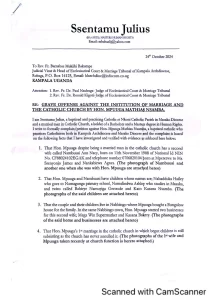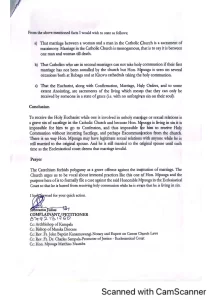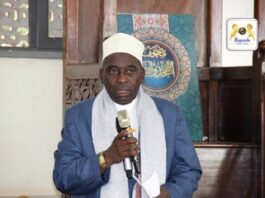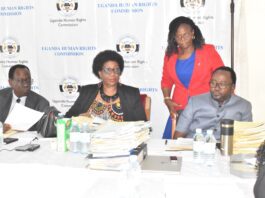
The Catholic Church’s Marriage Court at Lubaga Cathedral, Uganda, has acknowledged a petition filed against the Nyendo-Mukungwe Member of Parliament, Matthias Mpuuga Nsamba, for allegedly breaching the church’s laws relating to marriage vows.
This comes after a baptized and practicing Catholic, Julius Ssentamu, filed a petition against Mpuuga for unlawfully remarrying and bearing children with his second wife, Ann Nancy Nambuusi.
According to a petition addressed to the Judicial Vicar and Head of the Ecclesiastical Court and Marriage Tribunal, Rev. Fr. Barnabas Mukiibi Bakumpe, Ssentamu argued that Mpuuga continues to fully participate in the sacrament of Holy Communion, which the Catholic Church prohibits on grounds of adultery.
“I write to formally petition Mpuuga, a baptized Catholic who practices Catholicism both in Kampala and the Masaka diocese, that despite being a married man, he has a second wife with children but fully partakes in the Holy Communion, which is prohibited by the church laws,” part of the petition read.

Following the marriage court proceedings from the petition on November 8, 2024, held at Lubaga Cathedral, the court allowed the complainant to make preliminary submissions about his complaint.
However, the court ordered that such petitions of a serious nature, bordering on the suspension or expulsion of a person from the Catholic Church, must be handled with assistance and guidance from the archbishop.
“As a result, the hearing of the petition now awaits guidance from the Archbishop,” the ruling read in part.

The Catholic Church’s canon law strictly prohibits polygamy, as it is considered a grave offense against the institution of marriage. By allegedly taking a second wife while still being married in the Church, Mpuuga may have committed a serious breach of Catholic teachings, which could potentially lead to his expulsion or suspension from the Church if the allegations are proven true.
According to Catholic Church teachings, a person who has committed adultery cannot receive Holy Communion until they have repented and no longer have an adulterous relationship. The church considered adultery to be one of the most serious sins.
“Eating or drinking the bread or cup of the Lord in an unworthy manner is a sin against the body and blood of the Lord. Therefore, confession is required before receiving Holy Communion,” the church canon laws stated.
In receiving sacramental absolution, a person must repent and have true contrition for their sins. This means sorrowing over the sins committed and having a purpose to turn away from sin.









